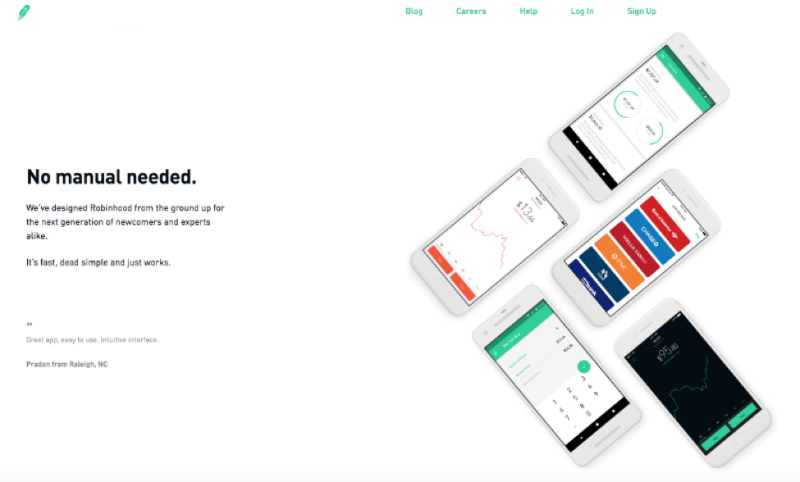Investigation of Bloomberg: why the stock startup Robinhood sells data on user requests

Recently, we wrote that Fintech-start-up Robinhood, which provides services for stock trading on American stock exchanges without commissions, has also accused of selling data on user applications to firms on high-frequency trading.
After that, Bloomberg journalists conducted their own investigation, and published a material describing the cooperation scheme of Robinhood and HFT-merchants. We present to your attention the main facts of this article.
')
How it works
On Wall Street, the practice of so-called “payments for the order flow” has existed for many years, that is, the flow of requests from customers. The pioneer in its implementation was Bernie Madoff, who was later convicted for creating one of the largest Ponzi-schemes in history.
Here's how it works: a retail broker, like Robinhood, focuses on attracting customers and creating trading applications. At the same time, he “transfers to the outsourcing” the actual execution of orders (sending them to the exchange). Often, HFT firms like Citadel, Two Sigma and Wolverine Securities assume the role of such an outsourcer. They pay the broker for the applications of its users. Since there is a choice to whom to transfer information about customer requests, Robinhood can choose those partners who will offer more money.
The market has developed an ambiguous attitude towards such cooperation. US federal laws governing brokering suggest that companies should look for the best options for fulfilling client requests. At the same time, the search for the best price is not a requirement. According to some experts, this loophole allows brokers to send orders to those buyers who offer more money, and the client can lose in the speed of execution of his order.
After reviewing the Robinhood statements for the last quarter of 2017, the journalists found out that the most of these startup data was sold to Citadel. On average, she paid $ 0.0024 per share in transactions conducted through herself. Considering that Robinhood users made transactions for $ 150 billion over the period specified in the documents, the total profits of the startup were quite large. Total revenues from HFT firms accounted for 40% of total Robinhood revenue in 2017.
Why are users dissatisfied
Robinhood was launched in 2013, and one of the main ideas of its founders was to oppose the practices established in the financial market. In particular, they focused on young people who had not yet had experience in trading on the stock exchange (millennials) - for a long time it was only possible to trade through Robinhood using a beautiful mobile application.
In addition, the company did not charge a commission for making transactions, instead offering, for example, Premium-rates - their owners, for example, can more quickly deposit and withdraw funds.
One of the founders of the project, Baiju Bhatt, stated that he was seriously influenced by the protests within the campaign Occupy Wall street in 2011. Previous company Bhatta and Robinhood co-founder Vlad Tenev (Vlad Tenev) was engaged in providing infrastructure for HFT trading. According to Bhatt, they felt involved in the overall market injustice.
Therefore, now, when it became known that a start-up estimated at $ 5.6 billion, which built marketing right up to choosing a name on the concept of “helping a little man in the fight against the rich,” uses questionable ways to make money, a scandal has arisen.
How Robinhood Responds to Charges
The company responded with a letter from Vlad Tenev on his website, in which he spoke about how the revenue of the Robinhood is formed and how exactly the company cooperates with HFT. In particular, the text says that a startup chooses which market maker to send an application based on which of them can offer the “best quality of its execution”.
Tenev also shared some numbers - he said that Robinhood earns about $ 0.00026 from each dollar used by clients for transactions. "If you buy a share for $ 100, we get 2.6 cents," he wrote.
According to Bloomberg journalists, after they asked for comments, the section “How We Make Money” changed on the Robinhood website. Now it does not allow comparing incomes from different HFT companies and brokers who enter Robinhood. If earlier information was provided on the basis of the processed shares, now calculations are based on “bargain dollars”.
“We publish information on the structure of the deductions received per dollar, since this accurately reflects the essence of our relations with market makers,” this change was described.
What's next
There have already been cases in the US where lawsuits have been filed against brokers using the practice of selling a stream of applications. Now is the trial of TD Ameritrade.
No formal complaints have been made to Robinhood yet, but analysts are not even embarrassed by the likelihood of such a development, but by the amount of revenue derived from cooperation with HFT. A small loophole in the law allows the company to earn almost half of its income, and this money can easily disappear if the law makes only one amendment.
All this may have a negative impact on the prospects of the company, which in its history has attracted $ 500 million from venture capital investors and announced plans to hold an IPO.
Other materials on finance and stock market from ITI Capital :
- Western securities analysis tool
- Analytics and market reviews
- Purchase of shares of American companies from Russia
- Huawei overtook Apple in terms of sales. The capitalization of the American company still reached $ 1 trillion
- Analysts: Microsoft's capitalization could reach $ 1 trillion
- Mass media: large-scale cyber attacks accelerated the growth of capitalization of companies from the information security industry
- Bloomberg: Hedge Funds Recognize Brexit Results Before Others And Earn Billions
Source: https://habr.com/ru/post/427715/
All Articles